Differential Equations, Dynamical Systems, and Linear Algebra
4.4
بر اساس نظر کاربران

شما میتونید سوالاتتون در باره کتاب رو از هوش مصنوعیش بعد از ورود بپرسید
هر دانلود یا پرسش از هوش مصنوعی 2 امتیاز لازم دارد، برای بدست آوردن امتیاز رایگان، به صفحه ی راهنمای امتیازات سر بزنید و یک سری کار ارزشمند انجام بدینکتاب های مرتبط:
مقدمهای بر کتاب "Differential Equations, Dynamical Systems, and Linear Algebra"
کتاب Differential Equations, Dynamical Systems, and Linear Algebra نوشتهی موریس هیرش و استفان اسمیل یکی از جامعترین و تأثیرگذارترین کتابها در حوزهی آنالیز سیستمهای دینامیکی، معادلات دیفرانسیل و جبر خطی است. این کتاب ترکیبی بینظیر از نظریهی ریاضی و ابزارهای کاربردی ارائه میدهد که دانشجویان، پژوهشگران و متخصصان را به درک عمیقی از دینامیک سیستمها هدایت میکند. در ادامه، به بررسی کامل بخشهای کلیدی این کتاب خواهیم پرداخت و اهمیت و تأثیر آن را بر دنیای علوم ریاضی شرح خواهیم داد.
خلاصهای جامع از کتاب
این کتاب در سه بخش عمده سازمان یافته است:
- معرفی مبانی و تعاریف اولیه در مباحث معادلات دیفرانسیل، که شامل روشهای کلاسیک و معاصر برای مطالعه رفتار سیستمهای دینامیکی است.
- بررسی نظریه سیستمهای دینامیکی در فضای فاز (Phase Space) و تحلیل پایداری. در این بخش، مفاهیمی مانند Trajectories، Fixed Points و Stable Manifolds به طور عمقی تحلیل میشوند.
- جبر خطی به عنوان ابزار اساسی برای تحلیل فضاهای برداری و ارتباط آن با دینامیک غیرخطی. موضوعاتی همچون Eigenvalues، Eigenvectors و Diagonalization به دقت توضیح داده شدهاند.
نویسندگان با بیانی ساده اما دقیق، چگونگی ارتباط معادلات دیفرانسیل و سیستمهای دینامیکی با جبر خطی را نشان میدهند. این رویکرد ترکیبی، خواننده را به شناختی جامع از چارچوب نظری و کاربردی این موضوعات میرساند.
نکات کلیدی
- تاکید بر فهم هندسی سیستمهای دینامیکی: کتاب خواننده را به درک تصویری از رفتار سیستمها دعوت میکند.
- پوشش گسترده مفاهیم جبر خطی در ارتباط با معادلات دیفرانسیل.
- استفاده از مثالهای ساده تا پیچیده برای نشان دادن کاربردهای واقعی نظریه در فیزیک، مهندسی و زیستشناسی.
- درک و تحلیل رفتار دینامیکی سیستمها در نزدیکی نقطههای تعادل.
نقلقولهای معروف از کتاب
"The combination of Differential Equations and Linear Algebra provides the key to understanding the dynamics of countless systems."
"Dynamics is the mathematics of change, the tool to describe and predict nature's motion."
چرا این کتاب مهم است؟
اهمیت کتاب Differential Equations, Dynamical Systems, and Linear Algebra ناشی از شیوهی منحصر به فرد آن در ترکیب سه حوزهی اصلی ریاضیات است که به کمک آن خوانندگان به درکی عمیق از دینامیک سیستمها دست مییابند. این کتاب نه تنها منبعی قدرتمند برای دانشجویان و متخصصان ریاضی است، بلکه زمینه را برای پژوهشهای پیشرفته در علوم طبیعی و مهندسی فراهم میکند.
یکی از جنبههای کلیدی این کتاب این است که مفاهیم پیچیده را به شکلی قابل فهم و ملموس توضیح میدهد، به طوری که بتوان آنها را به مسائل عملی تعمیم داد. همچنین، شیوهی ارائهی دقیق مفاهیمی همانند Stability Analysis و نقش Eigenvalues در تحلیل سیستمها، باعث شده تا این کتاب به مرجعی اساسی برای طیف گستردهای از محققان بدل شود.
Introduction to "Differential Equations, Dynamical Systems, and Linear Algebra"
Differential Equations, Dynamical Systems, and Linear Algebra, written by Morris W. Hirsch and Stephen Smale, is a foundational text that explores the interconnections between three fundamental areas of mathematics. This book is designed for both students and researchers, providing clear, concise explanations and developing a deep understanding of the subject matter. Its integrated approach allows readers to appreciate the profound implications of differential equations and dynamical systems while elucidating their linear algebraic underpinnings. With practical examples, rigorous proofs, and real-world applications, the text remains essential for anyone delving into these topics.
Detailed Summary of the Book
The book focuses on building an intuitive and theoretical understanding of differential equations, dynamical systems, and linear algebra, simultaneously illustrating how these fields complement and rely upon one another. It is divided into sections that progress logically: starting from foundational principles, introducing linear algebra to explore key properties of systems, and then moving into the dynamics of differential equations.
The early chapters form a basis for understanding the algebraic structures necessary for studying solutions to linear systems. Linear spaces, eigenvalues, eigenvectors, and matrices are presented in a lucid manner to prepare the reader for the dynamical systems approach later in the book. These tools are revisited often, with applications to solving differential equations in higher dimensions.
Later chapters dive into nonlinear systems and the methods used to study their stability, periodicity, and long-term behavior. Concepts such as phase space, equilibrium points, stability analysis, and invariant sets are introduced through rigorous mathematical definitions and proofs, accompanied by insightful geometric interpretations.
Throughout the book, numerous examples are derived from physics, engineering, and natural sciences, so readers can see how these mathematical topics inform real-world problem-solving. The integration of theory and applications ensures that the material stays anchored in practice as much as in abstract rigor.
Key Takeaways
- The book bridges the gap between pure mathematics and applied sciences by integrating linear algebra with differential equations and dynamical systems.
- It promotes a geometrical perspective for understanding dynamical systems, allowing readers to visualize systems' behaviors graphically.
- Foundational topics in linear algebra—such as eigenvalues, determinants, and Jordan forms—are developed in full detail to support analyses of linear systems of differential equations.
- Provides an introduction to stability theory, limit cycles, and bifurcation, which are crucial for understanding more advanced concepts in dynamical systems.
- Empowers readers to model and investigate theoretical and practical systems across physics, biology, economics, and other sciences.
- Encourages the use of rigorous mathematical reasoning while fostering curiosity about qualitative and long-term behavior of complex systems.
Famous Quotes from the Book
"Linear dynamics develops the intuition necessary for addressing nonlinear dynamics. In studying simplicity, we are preparing ourselves for complexity."
"Dynamical systems reveal not only the behavior of a system over time, but also the limits of prediction, stability, and ultimately, what chaos means in mathematics."
"We trust geometry and intuition to anchor our exploration; without geometry, analysis becomes aimless and directionless."
Why This Book Matters
This book stands out as a definitive resource for students and scholars in the realms of mathematics, physics, engineering, and applied sciences, as it fosters an understanding of the deep interplay between linear and nonlinear approaches to dynamic systems. Its enduring value lies in its ability to clarify abstract ideas with practical applications, while also instilling a geometric and qualitative perspective into these traditionally algebraic and analytical disciplines.
At a time when interdisciplinary work is becoming increasingly vital, this text provides researchers with the tools to model and predict complex behaviors that may arise in diverse fields ranging from ecological systems to economic markets and even neural dynamics.
By emphasizing the elegance of linear algebra and the qualitative power of dynamical systems through rigorous proofs and explanations, Hirsch and Smale’s work equips mathematicians and scientists alike with a foundation that is as relevant today as it was when the book was first published.
If you are someone who wishes to profoundly understand the core ideas of differential equations and dynamical systems, while mastering the tools of linear algebra, this book will undoubtedly serve as a cornerstone on your mathematical journey.
دانلود رایگان مستقیم
شما میتونید سوالاتتون در باره کتاب رو از هوش مصنوعیش بعد از ورود بپرسید
دسترسی به کتابها از طریق پلتفرمهای قانونی و کتابخانههای عمومی نه تنها از حقوق نویسندگان و ناشران حمایت میکند، بلکه به پایداری فرهنگ کتابخوانی نیز کمک میرساند. پیش از دانلود، لحظهای به بررسی این گزینهها فکر کنید.
این کتاب رو در پلتفرم های دیگه ببینید
WorldCat به شما کمک میکنه تا کتاب ها رو در کتابخانه های سراسر دنیا پیدا کنید
امتیازها، نظرات تخصصی و صحبت ها درباره کتاب را در Goodreads ببینید
کتابهای کمیاب یا دست دوم را در AbeBooks پیدا کنید و بخرید
1439
بازدید4.4
امتیاز0
نظر98%
رضایتنظرات:
4.4
بر اساس 0 نظر کاربران
Questions & Answers
Ask questions about this book or help others by answering
No questions yet. Be the first to ask!








![The Ultimate iOS Interview Playbook: Conquer Swift, frameworks, design patterns, and app architecture [Team-IRA]](https://s3.refhub.ir/images/thumb/The_Ultimate_iOS_Interview_Playbook__Conquer__29925.webp)







